GALLUP NEWS SERVICE
PRINCETON, NJ -- Consumer ratings of the current economy improved somewhat, and expectations for its direction improved substantially in early November, suggesting that consumer confidence -- like the president's job approval rating -- is experiencing a post-election bounce (see "Bush Gets Post-Election Bounce" in related items). In this regard, consumers are showing improved expectations for the way the stock market, economic growth, and the job market will perform during the months ahead.
Of course, these increased consumer expectations are not entirely surprising, with the Dow up by more than 700 points since Oct. 25 and new jobs surging by more than 300,000 in October. In fact, the real surprise in ║┌┴¤═°'s most recent economic polling may be that the post-election bounce in consumer confidence was not larger.
Ratings of the Current Economy
Consumer assessments of current economic conditions improved slightly in November, with the percentage of consumers rating the economy as "good" or "excellent" increasing from 34% in ║┌┴¤═°'s Oct. 11-14 poll to 36% in November, while the percentage rating it as "poor" fell from 22% to 20%. As a result, the difference (good/excellent minus poor) increased to 16 percentage points in November from 12 points in October.
November's difference is greater than the 9 percentage points of both November 2003 and November 2002. On the other hand, it is about the same as the 17-point difference found in ║┌┴¤═°'s September 2004 poll.
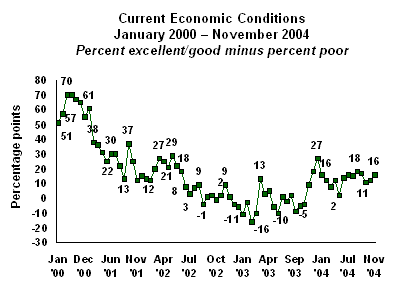
Ratings of the Economy's Direction
In November, 49% of consumers say current economic conditions are "getting better" while 43% say they are "getting worse." This is a complete turnaround from ║┌┴¤═°'s previous poll, conducted in mid-October, in which only 39% said things were getting better and 50% said things were getting worse.
While this sharp reversal in consumer expectations for the economy is good news, current consumer expectations are only modestly better than they were in ║┌┴¤═°'s September poll (47%), are modestly below those of July (51%), and are substantially below those of early January (66%). A year ago, 53% of consumers said economic conditions were getting better while 37% said they were getting worse.
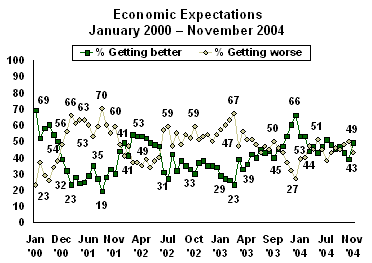
Stock Market Expectations
Fifty-five percent of consumers say they expect the stock market to go up "a lot" or "a little" over the next six months, with just 19% saying they expect it to go down. This suggests consumers are substantially more optimistic about the market than they were in October, when 43% said they thought it would go up while 21% said they thought it would go down. A year ago, consumers were just as positive as they are now about the direction of the stock market, with 54% expecting it to go up and 18% expecting it to go down.
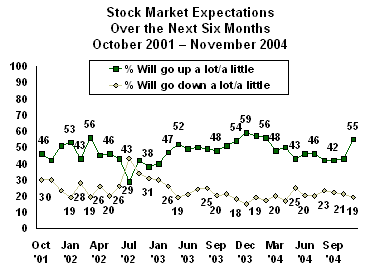
Economic Growth Expectations
The percentage of consumers expecting economic growth to go up over the next six months increased from 50% in October to 58% in November. This is about the same percentage who expected economic growth to increase in September (57%) and last November (58%). It is below the percentage of consumers who held this expectation in January of this year (62%) and in December 2003 (65%).
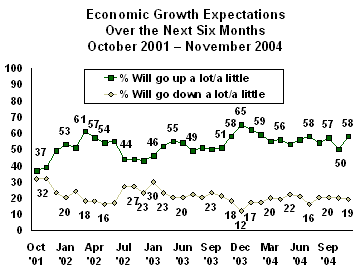
Job Market Ratings
In November, 37% of consumers say now is a good time to find a quality job -- the second-highest percentage since ║┌┴¤═° began tracking this measure. In fact, the previous high point, 39%, was reached in August 2001 -- the month measurement began. The current 37% represents a sharp improvement over the readings of October (29%) and a year ago (24%). At the same time, this month's rating is about the same as that of July, when 36% said it was a good time to find a quality job.
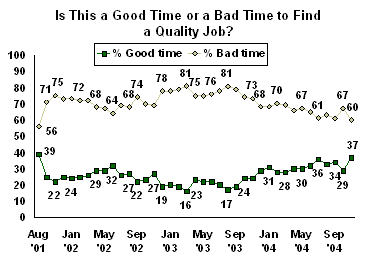
Bad ║┌┴¤═° for Retailers?
While the post-election bounce in consumer confidence is clearly welcome news, its magnitude is not reassuring. ║┌┴¤═°'s confidence measures suggest that the bounce brings consumer confidence back only to around its September level. This may be why the president's approval rating on the economy was up only one percentage point after the election, from 46% to 47%. And although consumers rate current economic conditions better than they did a year ago, they are also a little less confident that the economy is headed in the right direction. Based on November's relatively modest bounce in consumer confidence, it is hard to see why retailers should expect to see a better holiday season this year than they did in 2003.
Further, upper-income consumers remain much more positive about the economy than do lower-income consumers. For example, 48% of consumers having incomes of $75,000 or more a year rate current economic conditions as good or excellent, while only 21% of those making less than $30,000 provide those ratings. Similarly, 59% of these same upper-income consumers say economic conditions are getting better, compared to only 29% of lower-income consumers.
Of course, this divergence in consumer confidence makes sense when one considers the surge in the stock market and the disproportionate benefits it provides upper-income consumers. At the same time, today's high energy prices place a disproportionately large burden on the disposable incomes of lower-income consumers. Combined, these trends suggest less sales growth for low-end retailers than for their high-end counterparts this holiday season.
Survey Methods
Results are based on telephone interviews with 1,016 national adults, aged 18 and older, conducted Nov. 7-10, 2004. For results based on this total sample, one can say with 95% confidence that the maximum margin of sampling error is ±3 percentage points. In addition to sampling error, question wording and practical difficulties in conducting surveys can introduce error or bias into the findings of public opinion polls.
